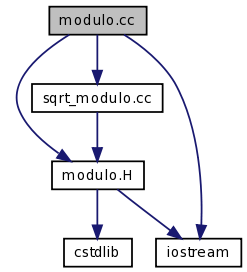
#include "modulo.H"
#include <iostream>
#include "sqrt_modulo.cc"


Go to the source code of this file.
Namespaces | |
| namespace | numtheory |
Defines | |
| #define | nightshift(VV, RR, KK) |
Functions | |
| bool | numtheory::strong_probab_prime (const unsigned int p, const unsigned int base) |
| bool | numtheory::probab_prime (const unsigned int p) |
| bool | numtheory::is_prime (register const int p) |
| signed int | numtheory::jacobi (int a, unsigned int b) |
| signed int | numtheory::legendre (signed int a, const unsigned int p) |
| unsigned int | numtheory::invmod (const unsigned int x, const unsigned int m) |
| unsigned int | numtheory::bininvmod (register unsigned int x, register const unsigned int m) |
| static const char shifts[64] | numtheory::__attribute__ ((aligned(64))) |
| unsigned int | numtheory::montgominvmod (register unsigned int x, unsigned int m) |
The functions implemented in this file provide support for fast modulo operations (multiplication, exponentiation, computation of the modular inverse, quadratic residues) and some integer functions (greatest common divisor, prime numbers).
Most of these functions contain also optimized assembler code for Intel Pentium and AMD Athlon processors.
Definition in file modulo.cc.
| #define nightshift | ( | VV, | |||
| RR, | |||||
| KK | ) |
Value:
asm( \ "mov %[v],%%ecx \n\t" \ "and $0x3f,%%ecx \n\t" \ "test $0x7f,%[v] \n\t" \ "movzx %[shifts](%%ecx),%%ecx \n\t" \ "jnz 1f \n\t" \ "bsf %[v],%%ecx \n\t" \ "1: add %%ecx,%[k] \n\t" \ "shr %%cl,%[v] \n\t" \ "shl %%cl,%[r] \n" \ : [v] "+r" (VV), [r] "+r" (RR), [k] "+rm" (KK) : [shifts] "o" (shifts[0]) : "cc", "ecx");
 1.5.4
1.5.4